Canon EF 40mm f/2.8 STM Review

Introduction
The EF 40mm f/2.8 STM is Canon's first ever EF pancake lens. Featuring a fixed focal length of 40mm and bright f/2.8 aperture, Super Spectra coatings that minimize ghosting and flare, a circular seven-blade aperture, a newly developed stepping motor for smooth and quiet continuous AF while capturing video, and a short minimum focusing distance of only 0.98ft/0.30m, the ultra-slim Canon 40mm f/2.8 lens is ideal for portrait, reportage, travel and landscape photography. The Canon EF 40mm f/2.8 STM is available now for £229.99 / €279.99 / $199.99 in the UK, Europe and the USA respectively.
Ease of Use
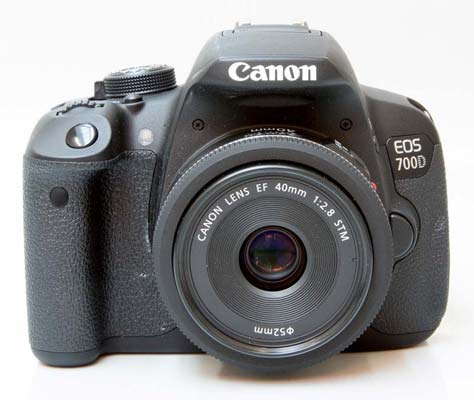 The Canon EF 40mm f/2.8 STM lens
The Canon EF 40mm f/2.8 STM lens
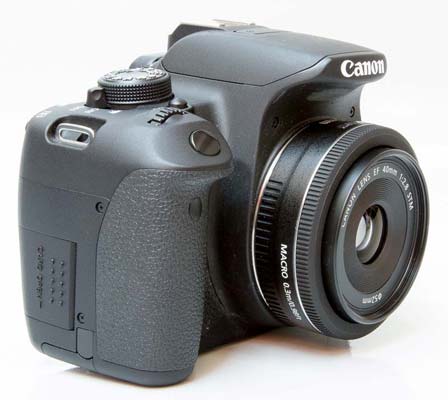 The Canon EF 40mm f/2.8 STM lens
The Canon EF 40mm f/2.8 STM lens
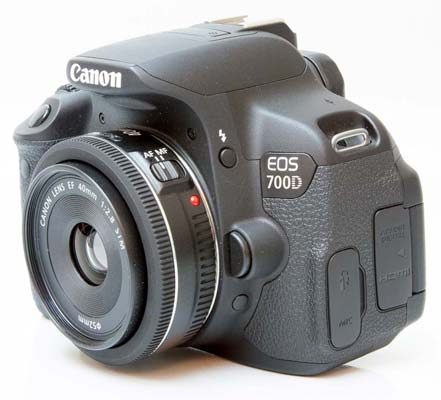 The Canon EF 40mm f/2.8 STM lens
The Canon EF 40mm f/2.8 STM lens
Weighing a mere 130g and measuring 22.8cm in length, the Canon EF 40mm f/2.8 STM is one of the tiniest lenses that Canon offers. You can use it on a Canon EOS APS-C body like the 700D that we tested it with for a short-telephoto 64mm equivalent angle of view, and it also balances well on a full-frame camera like the EOS 6D, providing a more "normal" field of view.
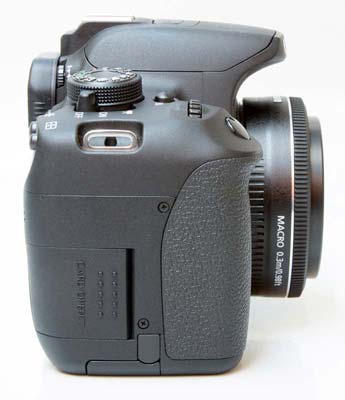 Side of the Canon EF 40mm f/2.8 STM lens
Side of the Canon EF 40mm f/2.8 STM lens
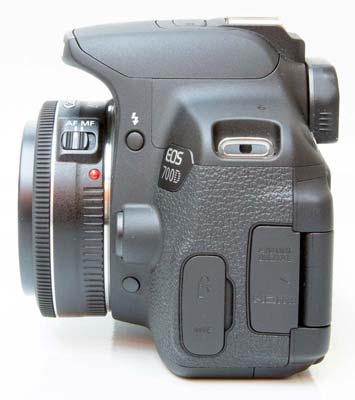 Side of the Canon EF 40mm f/2.8 STM lens
Side of the Canon EF 40mm f/2.8 STM lens
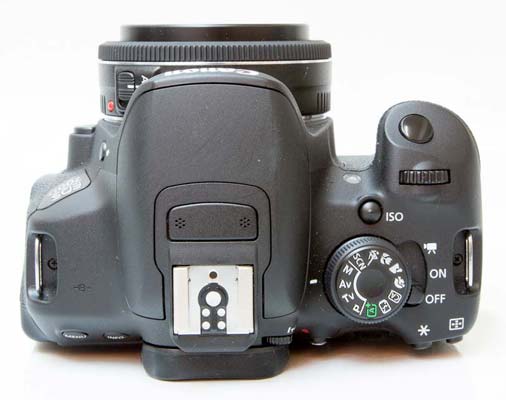 Top of the Canon EF 40mm f/2.8 STM lens
Top of the Canon EF 40mm f/2.8 STM lens
As you would expect from such an inexpensive lens, build quality is good rather than outstanding. The Canon EF 40mm f/2.8 STM feels solid in your hand, despite the all-plastic construction, with a metal mount adding to the solidity. The focusing ring is very narrow but has a ridged, rubberised grip band that assists with the finger-tip operation.
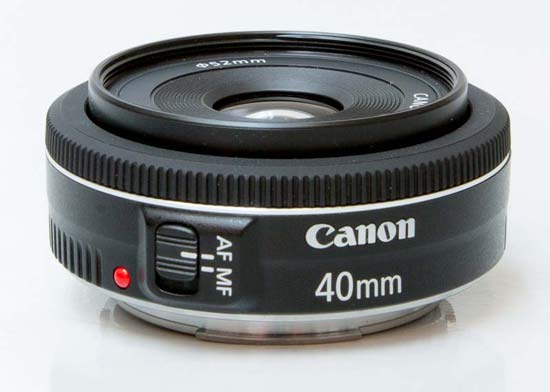 Front of the Canon EF 40mm f/2.8 STM lens
Front of the Canon EF 40mm f/2.8 STM lens
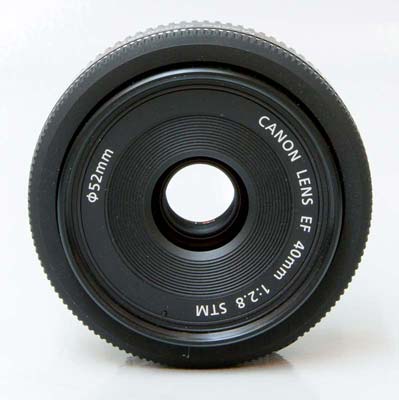 Front of the Canon EF 40mm f/2.8 STM lens
Front of the Canon EF 40mm f/2.8 STM lens
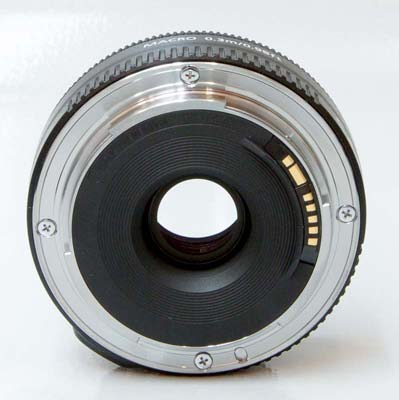 Rear of the Canon EF 40mm f/2.8 STM lens
Rear of the Canon EF 40mm f/2.8 STM lens
The only other control on the lens barrel is a focus mode switch with the usual AF/MF settings. Note that this lens offers full-time manual focusing even when AF is selected.
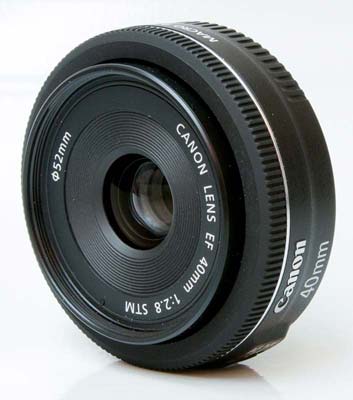 Front of the Canon EF 40mm f/2.8 STM lens
Front of the Canon EF 40mm f/2.8 STM lens
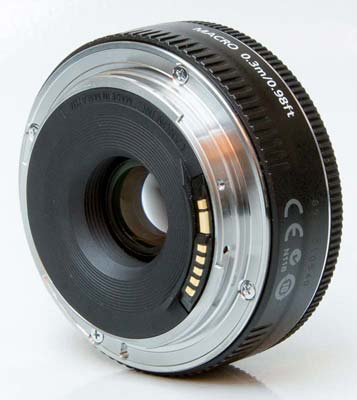 Rear of the Canon EF 40mm f/2.8 STM lens
Rear of the Canon EF 40mm f/2.8 STM lens
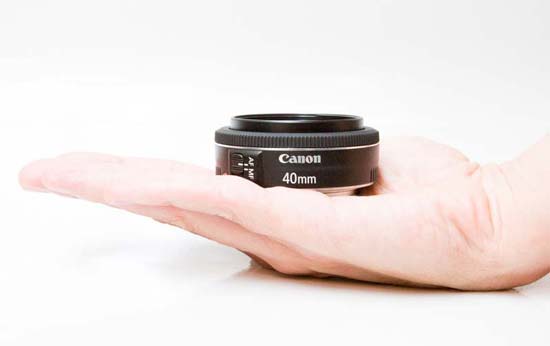 The Canon EF 40mm f/2.8 STM lens in-hand
The Canon EF 40mm f/2.8 STM lens in-hand
The lens doesn't ship with either a lens hood or a protective bag. It accepts 52mm filters.
Focal Range
At the 40mm focal length the angle of view is 57°30'.
 Field of view at 40mm
Field of view at 40mm
Focusing
Given its tiny size, the Canon EF 40mm f/2.8 STM lens understandably has a very narrow focusing ring. Manual focusing is of the electronically-driven, 'focus-by-wire' type, more typically found on compact system cameras. There are no hard stops at either ends of the range, making it more difficult to set focus at infinity. Polariser users should be pleased that the 52mm filter thread doesn't rotate on focus.
When it comes to auto-focusing, the Canon EF 40mm f/2.8 STM zoom is a fairly slow performer, taking about 0.3 seconds to lock onto the subject when mounted on the Canon EOS 700D that we tested it with.
We didn't experience too much "hunting" though, either in good or bad light, with the lens accurately focusing almost all of the time. It's also a quiet performer, thanks to the built-in STM (Stepping Motor), which makes this lens well-suited to video recording.
Chromatic Aberrations
Chromatic aberrations, typically seen as purple or blue fringes along contrasty edges, are impressively well controlled with this lens - the examples below show the worst-case scenario.
 |
 |
Light Fall-off
With the lens wide open at f/2.8, you can't really see any light fall-off in the corners, and distortion is also very well controlled.

Macro
The Canon EF 40mm f/2.8 STM is not really a macro lens, but the close-focus point is a useful 30cm from the film/sensor plane, and Canon quotes a maximum reproduction ratio of 0.18x for the lens. The following example illustrates how close you can get to the subject, in this case a CompactFlash card.
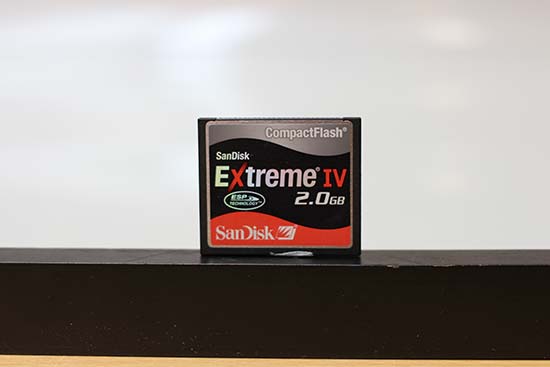 Close-up performance
Close-up performance
Bokeh
Bokeh is a word used for the out-of-focus areas of a photograph, and is usually described in qualitative terms, such as smooth / creamy / harsh etc. One of the reasons to buy a fast lens is to be able to isolate the subject from the background, and the Canon EF 40mm f/2.8 STM has an iris diaphragm with 7 rounded blades for a pleasing rendering of the out-of-focus highlights. Below you'll find some examples, but you are also encouraged to check out our sample images.
 |
 |
 |
 |
Sharpness
In order to show you how sharp this lens is, we are providing 100% crops on the following page.
